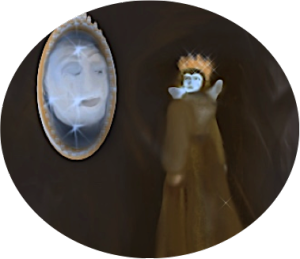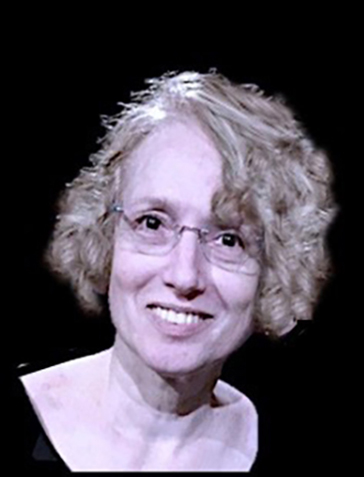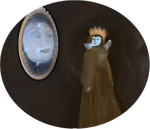February 2015
A lot has been said about what we see when we look in the mirror. As objective as a reflection may be, we see an image that is based on our self-perception, individual history and social expectations.
We are often also desensitized to gradual changes in our appearance, and only become aware of them when we come across old pictures of ourselves, when we looked younger, thinner, or had more hair.
 When Snow White’s evil queen looks in her magic mirror, she cannot see her own image. The face staring back at her belongs to the mirror itself. The information she receives about her image reflects through the filter of the mirror’s judgment. It is not up to her to decide whether or not she is the most beautiful woman in the kingdom. Her self-worth depends entirely on the mirror’s judgment.
When Snow White’s evil queen looks in her magic mirror, she cannot see her own image. The face staring back at her belongs to the mirror itself. The information she receives about her image reflects through the filter of the mirror’s judgment. It is not up to her to decide whether or not she is the most beautiful woman in the kingdom. Her self-worth depends entirely on the mirror’s judgment.
Since the magic mirror holds the ultimate power to determine the queen’s worth, the only way for her to become the most beautiful woman in the kingdom, is to change its mind in order to control how he sees her. She knows what she has to do.
In a sense, I think most of us use each other as magic mirrors to some extent. We usually like the company of those who “reflect” to us that we are worthy, smart, beautiful, or anything else we deem important as part of our self-definition. We often seek the closeness of those who are not only great people in our eyes, but also make us feel that we are great by reflecting a positive image of ourselves back to us.
However, what happens if, like in the fairytale, the mirror has the ultimate power to define us? Moreover, what happens when the mirror has only one role in our lives, i.e., to continuously provide us with a positive reflection, so we can feel worthy, happy and confident?
Unfortunately, this happens all too often in real life. A person might assign the power of definition to a designated “magic mirror”, e.g., a spouse or a best friend.
The person who is assigned the role of the mirror becomes responsible for the well-being and happiness of the other. He or she is now expected to reflect what the other needs to see to feel good.
More often than not, the person pushed into this role is not even aware of this responsibility. If they dare to disagree, challenge or not participate when a positive reflection is needed, they are surprised to discover that their friend, or their spouse, is upset with them.
In more extreme cases, the person in the mirror role loses his or her status as a human being and becomes nothing but a mirror. Every word, action, or opinion is interpreted as a reflection of the other (e.g., “you were late coming back from work, it means I am not important to you”). The person acting as the mirror is not even seen by the other. They are required to change their ways, regardless of their own needs or preferences, which makes them feel manipulated or controlled.
In reality, when we look to others to reflect our self-worth back to us, all we see is a mere projection of our self-judgments. We interpret what they say or do to match what we already think about ourselves.
If the evil queen had a better sense of who she was, and if she had it in her heart to accept herself, maybe she wouldn’t have had to rely on her magic mirror that much. She would be happy, of course, to hear that she is the most beautiful woman in the land. However, no matter what the mirror says, it wouldn’t have to define her. Instead of trying to change his mind, she could just as easily stare back at him and say, “I am sorry to hear you no longer think I am the fairest of them all. That’s your opinion. I am, and will always be beautiful”.



